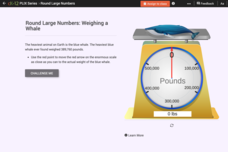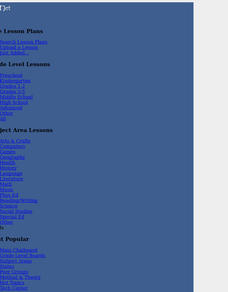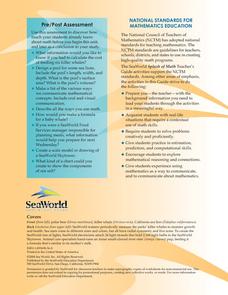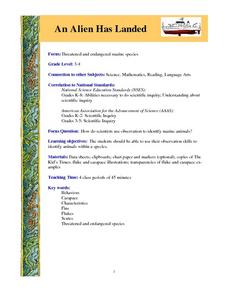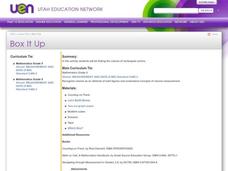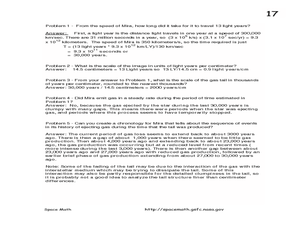Curated OER
How Big Is A Humpback Whale?
Students explore humpback whales. In this humpback whale lesson, students determine the actual size of humpback whales and use diagrams to identify the major features of the humpback whale.
CK-12 Foundation
Large Decimal Rounding to Decimal Representations: Weighing a Whale
An interactive challenges mathematicians to round large numbers with help from a large scale that measures the weight of a blue whale. The practie's five questions include multiple-choice, fill-in-the-blank, true or false, and an open...
Curated OER
Energy Through the Ages
In this energy through the ages learning exercise, students read about the history of energy use beginning with early civilization and the use of water wheels for the production of energy to hydrocarbon-based coal, oil and natural gas of...
Curated OER
Blubber Gloves
The ways that animals adapt to their environments is quite remarkable. In this life science lesson, fifth graders take a look at some of the ways that aquatic animals that live in Arctic or Antarctic waters survive. They perform an...
SeaWorld
How Big is a Blue?
Whales are all big, but some are larger than others! Kids will love sorting the 10 whale species by size at their desk (whale cut-outs provided). Next, use a whale rope to visualize how long each of these whales actually is. A large...
Curated OER
Using Operations
In this problem solving activity, students read the strategies and steps to solve word problems. Students solve 2 problems about blue whales.
Curated OER
How Big is Big?
The blue whale is the focus of this life science worksheet. Students read an excellent selection on the blue whale, and answer ten comprehension questions. Then, students are divided into two groups. Each group has to estimate how big 85...
Curated OER
the Whale Game
Students listen to whale stories and answer addition and subtraction problems in the stories. In this addition and subtraction instructional activity, students receive 20 goldfish. Based on the story they eat the goldfish....
Curated OER
How Deep Do They Dive
Learners calculate and graph the diving depths of various types of whales. They cut out and glue whale pictures on a worksheet to represent the diving depths for five whales, and discuss how people use graphs to communicate.
Curated OER
How big is a whale
Learners research the size of whales using print books or the internet. Students do the research in groups. They compare and graph the results.
Curated OER
Measures
Estimate and explore the length and weight of classroom items using standard measurement and scales. Students will work in groups to determine appropriate measuring tools, weigh or measure items, and record their results on a data chart....
Sea World
Splash of Math
How can kids use math to learn about marine life? Combine math skills with science lessons in a resource featuring activities about life in the sea. Kids graph and calculate data, solve complex word problems, measure geometric shapes,...
Curated OER
Location on a Grid
This grid features 15 animals, and scholars use a coordinate system to describe the location of each. The x-axis is labelled with letters and the y-axis with numbers, and they list the coordinate pairs beside the animal names below the...
Curated OER
Column Addition
Third and fourth graders read the addition word problems and use the sets of numbers within the problem along with column addition to solve the problems.
Curated OER
How Big is a Blue?
Students determine the length of different whales using a rope marked off and color coded to each length. They create life-size scale drawings of whales on butcher paper.
Curated OER
A Proportional Fish Story
In this proportions worksheet, students identify and complete 8 different problems that include using proportions to build scale models of various animals. First, they use the scale to complete the chart and draw lines representing the...
Curated OER
Miami Metrozoo & Mathematics
Twelfth graders use Algebra and Geometry to solve a real life problem at the Zoo.
Curated OER
An Alien Has Landed
Students identify animals within a species by using their observation skills to record information, such as behavioral characteristics.
Curated OER
Box It Up
Fifth graders make boxes. In this prisms lesson, 5th graders read the book Counting on Frank and discuss the different things that the boy measures. Students make boxes of various sizes using graph paper and find their volume.
Curated OER
A Star Sheds a Comet Tail!
For this comet tails and stars worksheet, students read about the star Mira and the vast clouds of gases it emits. They use a photograph from the Galaxy Evolution Explorer satellite to solve 5 problems about the scale of the image, the...
Curated OER
Compare Sets of Objects Guided Lesson
Practice math vocabulary terms fewer, more, and data using this visual-object-analysis guide. Learners observe three sets of objects and answer three questions, two of which compare numbers of objects, and the last which...
Curated OER
IS A BLUE WHALE THE BIGGEST THING THERE IS?
First graders explore measurement in relation to size of objects.
Curated OER
"Is a Blue Whale the Biggest Thing There Is?" by Robert Wells
Middle schoolers discuss how big is big. They compare the area and perimeter of an acre and a football field.
Curated OER
Convert Metric Units of Length
In this metric unit learning exercise, students use a table to solve problems related to length of different types of whales using centimeters, meters and kilometers.

